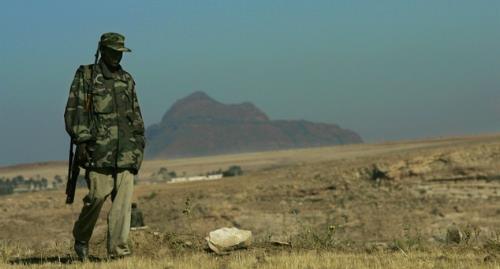'Significant' casualities in Eritrea and Ethiopia border battle
Arch-rivals Ethiopia and Eritrea traded blame Monday for a border battle in which "significant" casualties were reported, one of the worst clashes since the end of a 1998-2000 border war.
"There were significant casualties on both sides, but more on the Eritrean side," Ethiopian government spokesman Getachew Reda told AFP.
He said the battle that began Sunday was one of the most serious in recent years, noting that while the two sides had exchanged gun fire in the past, this clash was on a far larger scale. The fighting had reportedly calmed on Monday.

in the Tigray region on November 19, 2005 ©Marco Longari (AFP/File)
"We used to take precautionary measures against this regime, but this time was much more important in terms of magnitude than the measures that were taken so far," Getachew added.
Both sides blamed the other.
Ethiopia on Sunday "unleashed an attack against Eritrea on the Tsorona Central Front," Eritrea's ministry of information said in a statement.
Getachew instead claimed the fighting started when Eritrean artillery fired shells across the border.
"Eritrean forces started shelling our positions, including civilian ambulances, and we responded," said Getachew, who had initially claimed no knowledge of the fighting.
Eritrea won independence from Ethiopia in 1991 after three decades of war, but returned to battle in 1998-2000.
- Fortified frontier -
The two remain bitter enemies, with their troops still eyeing each other along the fortified frontier. Tensions are never far from the surface.
"The purpose and ramifications of this attack are not clear," Eritrea said, adding it "will issue further statements on the unfolding situation."
Eritrea and Ethiopia have long traded accusations of attacks and of backing rebels to needle each other.
In March 2012, Ethiopia attacked an Eritrean military base, accusing the country of supporting "terrorist activities" on its territory.
In February, Ethiopia accused Eritrea of being behind anti-government protests in the Oromia region last year which led to a violent clampdown by the government in Addis Ababa.
The two countries remain at odds over the flashpoint town of Badme, awarded to Eritrea by a United Nations-backed boundary commission but still controlled by Ethiopia.
It was not immediately possible to verify independently the scale of the clashes and exact reason they started.
Eritrea's media is ranked below North Korea as worst in the world for press freedom by Reporters Without Borders.
However, opposition Eritrean websites, run from abroad but with contacts inside the country, reported there were clashes along the border.
"Each side appears to be calling up reinforcement," Awate.com website reported.
The Asmarino website carried a statement from opposition campaigners appealing for calm.
"The prospect of another war is inconceivable," the statement read.
Thousands of Eritreans risk their lives to flee the hardline regime every month according to the UN, fleeing across the border into Sudan and Ethiopia despite a shoot-to-kill policy along the frontier.
Those who escape describe crawling under razor wire, tiptoeing across minefields or sneaking past armed border guards in their bid for freedom.
Last week the United Nations Commission of Inquiry (COI) on human rights said the government of President Isaias Afwerki, in power since 1991, was guilty of systematic enslavement, forcible conscription and other abuses.
Eritrea rejected the findings as "laughable."


![[AIM] Asmarino Independent Media](/images/logo/ailogo.png)